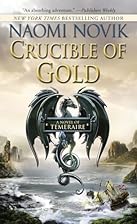85) Lawrence in Arabia, by Scott Anderson.
Even though it took me a week and a half to complete and was a bit of a slog at points, I'm glad I finished this history of WWI in the Middle East. It isn't exclusively about T.E. Lawrence, though his outsized personality carries the narrative--we follow a multinational assortment of historical figures all jockeying for power and influence as the Ottoman Empire loses control of the Arab world over the course of the war. The author at once raises some intriguing what-ifs that might've given us a better and more peaceful world even today while acknowledging that even a best-case scenario would've had its share of simmering sectarian tension.
86) Sunrise Over Texas, by M.J. Frederick.
For the 2013 romance TBR challenge. Detailed post to come next week.
87) Crucible of Gold, by Naomi Novik.
The first book in this series, His Majesty's Dragon, is one of my favorite reads of all time, but I took a break from it after Victory of Eagles, for reasons that have more to do with me as with the book itself. You see, my proverbial Book Under the Bed (which of course does not live under an actual bed, not in 2013, but is instead a file on my hard drive and backed up to Dropbox that I get out and look at every year or two, because someday I mean to go back to it) is an alternative history/adventure story of the Napoleonic Era. And Victory of Eagles is the closest Novik's story comes to overlapping mine. Not in a way that would prevent me from publishing the Book Under the Bed--our approaches and plots are very different. No, it's more that I spent the entire read arguing with the book, particularly with her portrayal of Wellington. As those of you who've followed me around the blogosphere may know, I'm kinda fond of the Great Duke. As in, historical crush fond. He's one of the three protagonists of the BUtB, and while I hope my portrayal is true to the sarcastic, snobby, and all-around-difficult aspects of his personality, he also comes across as badass and awesomesauce (which I think is also justified by the historical record).
Which probably sounds a bit petty of me, to say I didn't like Victory as much as previous entries because I didn't like Novik's Wellington. But that's just the surface reaction. It's more that I find it weird and a little disconcerting to read anything too similar to what I'm writing--and when Victory came out, the BUtB was my beloved work-in-progress, which I was polishing for submission to editors and agents. I'm not one of those authors who can't read the same genre I write, but I find myself reading fewer Regencies now than before I started writing them. When I hear about a book that's very similar to something I'm writing or planning to write, I'm more likely to avoid it than read it--if it's too close to my approach, I worry about accidental influences, and if it's too different, I know I'll be too busy arguing with the story to really sink into it properly. With Victory, I think I had a weirdly strong reaction to the book because it was simultaneously too much like the BUtB and too different from it, unlike any book I've read before or since, so reading it induced a kind of mental whiplash.
Anyway, after reading a strong review of the latest book, I decided to go back to the series, and I'm glad I did. I got exasperated with Laurence a few times, but the dragon interactions were delightful, I liked seeing more of Emily Roland, who's always been one of my favorite secondary characters, and I was fascinated by how Novik developed an Incan society where the human population had been decimated by European diseases as in real history, but the Incan dragons had prevented European conquest. And...I certainly wasn't expecting that twist with the Incan empress. I can't wait to see what happens in the next book.

It's much the same with doing theater (community, anyway). Don't look at movie versions of the same role because you'll wind up imitating them instead of finding your own portrayal.
ReplyDeleteThere are a few authors whose voices are so strong one of my critique partners can tell if I've been reading them recently--OK, two. Jane Austen and Patrick O'Brian, and there are FAR worse influences to have.
DeleteGreat readding your post
ReplyDelete